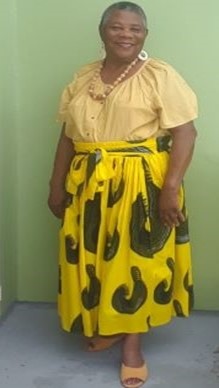Amplifying the Voice of Women Farmers in Dominica
July 13, 2022
Women represent about 20% of total farmers in Dominica and are primarily engaged in producing tuber and root crops and vegetables for both food self-sufficiency and local markets. They are largely engaged in subsistence agriculture to provide food for their households and participate as street and market vendors in the informal economy connected to the agriculture and fisheries sectors.[1] As subsistence farmers, women play a critical role in ensuring food security, nutrition, and livelihoods in rural and urban communities. However, these forms of employment lack security, social protection is scarce and many of these women are the heads of single-parent households making them extremely vulnerable.[2] Despite the important role these women play, their voices are not being effectively heard.
Amplify these voices!
Through the joint programme, ‘Building Effective Resilience for Human Security: The Imperative of Gender Equality and Women Empowerment in a Strengthened Agriculture Sector’ the United Nations Development Programme (UNDP) provided technical support to women farming groups and other farming individuals in Dominica to strengthen the advocacy platform of women farmers – this intervention will allow women’s voices to be included in decisions related to improved policy development.
UNDP’s work focussed on building capacities for the utilization of the Community Score Card (CSC) as a tool to diagnose issues impacting farming groups while identifying solutions and the partnerships needed. This activity would help women farmers to apply a tested methodology when tackling issues affecting them within the sector. Areas included planning, assessing issues, and identifying possible solutions within their organizations through self-assessment prior to consultations and meetings with service providers, policy makers and other stakeholders in the sector. Speaking to the intervention’s success, not only at inclusion but also at promoting collaboration, Annette Bates, a 79 year old dasheen farmer stated, “The community score card brought us together with the extension officers and farmers and gave us the opportunity to see how we are part of the solution to our challenges and how together we could discuss solutions to solve them, and we are now engaged in planting a white potato demonstration plot with the Belles farmers group and some Warner farmers and that is a good thing”

Annette Bates, Beneficiary
Several farmers noted that the community score card sessions helped to strengthen and empower their voices within their communities, promoted dialogue, consensus building, information gathering, established mechanisms of direct feedback between farmers and the agricultural extension team, enhanced confidence, provided consensual solutions to identified problems and built local capacity to hold the public sector accountable as well as allowing the farmers to engage effectively in public deliberations on priority issues.
An important success of the initiative was that it made all stakeholders and partners aware that they were a critical part of the solution and provided an entry point for advocacy opportunities in the implementation and design of policies and programmes within the agriculture sector.
Having this new tool to share their views, it was also important to ensure that the women farmers were confident in using their new platform. Recognizing that many farmers felt uncomfortable with speaking and participating publicly, UNDP also supported virtual training for 15 farmers in public speaking and professional development with the support of The UWI Open Campus.
Annette, expressed her thanks to the lecturer, project coordinator, and her fellow women farmers for their encouragement and patience in supporting her as she participated in the course. ‘I was invited to take the fundamentals of public speaking course via zoom I was hesitant and nervous, I had not taken a college course in over 33 years, not to mention on zoom. I did not know if I would be successful, in passing the course. I am happy and proud to say that I passed the course with an “A"! Even though I had experience in speaking publicly, it was good to gain pointers to speak better, understanding the different types of speech for example a formal and informal speech, acceptance, special occasion, informative, persuasive, and entertaining speech.’
“Before the project I was very shy and always afraid of talking in front of people, especially a lot of people, I got better over time, and learnt to speak better, I have understood the importance of preparing and planning properly.”Kiera Henry, Beneficiary
It is also important to note that the session catered to a diverse group of women and the much younger 17-year-old Kiera Henry, a female member of the Belles Farmers Group, welcomed the virtual course. “Before the project I was very shy and always afraid of talking in front of people, especially a lot of people, I got better over time, and learnt to speak better, I have understood the importance of preparing and planning properly.” She explained, “I see this as an opportunity to help to represent my group and to provide support in preparing PowerPoints and planning speeches for them for special occasions.”
Women farmers throughout the Eastern Caribbean - and particularly in Dominica - are impacted by policies and programmes implemented at the national level. They also encounter many challenges in accessing credit due to limited assets in the form of land (37.6% have less than 1 Acre or are landless), markets, resources, and services. Much is linked to the absence of gender-disaggregated data to inform evidenced based decision making and policy formulation and a key factor that is missing is the voice of the small farmer and woman farmer.
By amplifying their voices and supporting the inclusion of small and women farmers in national discussions, we ensure the human security approach is fully integrated in programming and policy formulation at the national level.
[1] EnGenDER Dominica Climate Resilience Analysis, 2021
[2] IsraAid-Dominica Value Chain Selection Component 1 Report, Dominica Value Chain Analysis Study, April . 2020

 Locations
Locations